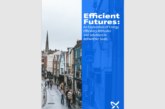
The Freight Transport Association (FTA) has joined forces with three trade associations to raise concerns about the way HGVs are treated in future Clean Air Zones (CAZ).
FTA, the British Vehicle Rental and Leasing Association (BVRLA), the National Franchised Dealers Association (NFDA) and the Road Haulage Association (RHA) have written a joint letter to Transport Secretary Chris Grayling.
The trade associations have called for Government support in ensuring the introduction of CAZs will not unfairly hit businesses who rely upon HGVs.
Head of UK Policy at FTA, Christopher Snelling commented: “We support the need to improve the quality of air in our cities, but given CAZs only bring forward the beneficial change that is coming anyway by a couple of years, we don’t want this to be at the cost of small businesses’ ability to trade.”
It has been noted that a number of cities across England are considering the introduction of HGV charging CAZ in a bid to reduce illegal levels of roadside NOx emissions.
While the associations say they fully support the environmental aims behind the introduction of CAZs, they want to encourage the Government to implement a system which works for businesses as well as having a impact on pollution.
The joint letter asked the Minister to meet and discuss various solutions which could lessen the impact on businesses. These included:
- Providing improved access to road space, by allowing night time deliveries or limited access to bus lanes.
- Providing CAZ charge exemptions at night time or on certain routes, for example roads leading to garages, test centres or distribution hubs that are just inside a zone
- Introducing a reduced charge for Euro V trucks, helping to maintain their used value and thus making it easier for operators to sell these vehicles and fund an upgrade to Euro VI HGVs
- Ensuring that CAZ standards and administration are consistent across the country and communicated properly
- Providing local authorities with more guidance and resources to identify local congestion and pollution hotspots and improve traffic management, thereby reducing the imperative to introduce a CAZ
Christopher concluded: “HGVs are an integral part of the economy at national, regional and local level. Currently, there are no commercially or operationally viable alternatives to diesel in terms of HGV motive power. Over 90% of everything the public eat, drink, wear and build with travels on an HGV at some point in the supply chain.”
Related news:
Lawsons adds natural gas powered Iveco truck to London fleet









